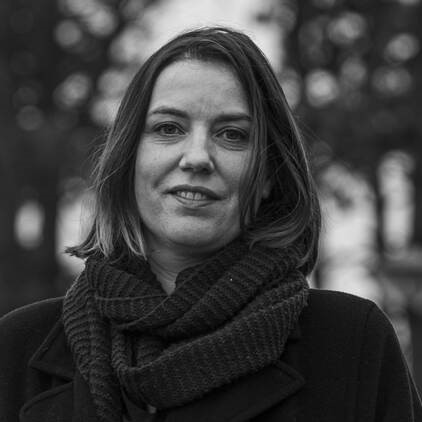
Bekijk deze pagina in het Nederlands
Ethics adviser Laura Hartman
‘Dying and mourning are different for everyone: there is no one-size-fits-all approach’
16 mei 2023
Many people assume that a good death isa death where the dying person is surrounded by family and friends. ‘In practice, things often go differently’, says Ethics adviser Laura Hartman. She believes that more attention should be devoted to the capricious, often unpredictable variations when it comes to dying and mourning. ‘The needs of dying people and mourners often vary greatly. Coordination and flexibility are therefore preconditions for effective support.’

‘You will find a lot more words for success than for loss in policy language’
Laura Hartman, a former ethics advisor at the Council for Public Health and Society (RVS) and the Centre for Ethics and Health (CEG).
As project leader of the advisory process Stervelingen (Mortals) of the Council for Public Health and Society (Raad voor Volksgezondheid en Samenleving, RVS), researcher and Ethics adviser Laura Hartman spoke to care providers, policymakers, bereavement counsellors and people who had experienced a death in their immediate circle. What struck her the most during all those conversations? ‘The fact that almost everyone who had lost a loved one had felt very lonely for a considerable period of time.’
Before they began the RVS process, she thought that we were pretty good at dealing with dying, mourning and loss in the Netherlands. ‘That is not the case at all!’, according to people who had suffered a major bereavement. Hartman: ‘They often had the feeling that they were burdening others if they discussed their feelings of mourning and loss.’
Pre-conference
How can we deal with dying, loss and mourning more effectively? That will be the topic of Laura Hartman’s lecture (in English) at the pre-conference Connecting Communities in the Netherlands about the future of palliative care in the Netherlands, which is being organised by Agora and PZNL. Hartman’s lecture is based on the RVS advisory report ‘Stervelingen – Beter Samenleven met de dood’ (Mortals – Living better with death) (2021)
If you would like to attend the lecture during the pre-conference ‘Connecting Communities in the Netherlands’ on 14 June, please register today via: Registration pre-conference
Why do we find it so difficult to deal with dying, mourning and loss?
‘The more we can be cured and the longer we are able to live, it is becoming increasingly difficult to talk about death. We push our mortality away, as it were. One telling anecdote is that in the past children didn’t know where babies came from, but they did know what a deathbed looked like. The opposite is now true. The reason for that is because two thirds of people nowadays die outside the home: in a hospital, nursing home or hospice. At the same time, as a result of the decreasing influence of churches and greater cultural diversity, we also have less fixed rituals for dealing with death. We no longer have something to hold onto, as a result of which many people ill-prepared for coping with dying, mourning and loss.’
Does that also apply to policymakers and other professionals who are faced with dying and mourning?
Yes, that often begins already with unease and embarrassment about finding the right words. You will find a lot more words for success than for loss in policy language. Elderly people should ‘vitaal ouder worden’ (grow old with vitality). The final stage of increasing dependence and decreasing health, which sometimes lasts 15 years, is barely mentioned in policy jargon. And in the case of cancer patients, war metaphors are often used: they must ‘stand up to cancer’. If you are not able ‘to conquer’ cancer, you’re a loser. It is also telling that people often spoke about ‘excess mortality’ during the COVID-19 pandemic. That is an abstract term, which masks a world of suffering and emotions that we don’t mention.’
How can professionals express themselves better?
‘That’s a question of trial and error; there is not one way to do that. However, I think it would be good to mention vulnerability, loss and approaching death more often and to look for new words, expressions and metaphors for loss and dying. The writer Babet te Winkel wrote a book using self-invented terms for mourning and loss, such as aanwezig in afwezigheid (present in absence): how someone is still there in the empty places that the deceased person leaves behind. For example, in the chair where he/she always sat. A metaphor that mourners often find relatable and helpful is that of the ball in the box. Imagine a ball in a box in which there is a ‘pain button’. At the beginning of the grieving process, the ball is so big that it takes the slightest thing for the ball to press the pain button. The more time passes, the smaller the ball becomes and it touches the pain button less often. However, the ball can still always end up on the pain button. The pain can then be as intense as at the beginning of the grieving process. The idea is that grief never completely passes and that people can always be overcome by sadness at unexpected moments.
What can professionals and policymakers in the care and welfare sector do to ensure that dying people and mourners feel more supported?
‘Research shows that there is usually a core network during a dying process: 1 to 5 people who experience the dying process at close quarters and provide care. It would be good if professionals in the care and welfare sector not only paid attention to the dying person, but also supported that core network. That could also provide more peace to dying people.
Furthermore, I think that professionals should always be aware of the capricious, often unexpected variations when it comes to dying and mourning. Many people assume that a good death is a death where the dying person is surrounded by family and friends. They speak openly about death, everything is said, all quarrels are set aside. Things often go differently: in that case, there is actually a quarrel or someone dies alone. Or the dying person doesn’t want to talk about death and has not arranged anything. The needs of dying people and mourners also vary greatly. Coordination and flexibility are therefore preconditions for effective support.’
‘More attention should be devoted to the capricious, often unpredictable variations when it comes to dying and mourning.’
In the case of dying and mourning, does professional support primarily fall under care and welfare?
‘It sometimes seems that people die ‘in the care sector’, as if other sectors have nothing to do with it. However, the opposite is true. Municipalities, for example, can help ensure that dying and mourning become more natural parts of our society once again, for instance by organising annual activities related to death and mourning, or by inviting artists to create art about dying, mourning and loss in the public space. We can also do things in all kinds of other spheres in society in order to live better with death. This can vary from an employer giving someone from the core network a few weeks of leave, to a school that allows a student to resit an exam, because it was scheduled on the anniversary of her brother’s death.
However, there is no one-size-fits-all approach. One person needs to take a long time off following the death of a loved one, while the other actually wants to start working again as soon as possible.
There is a growing group of so-called ‘tussenlanders’: people who cannot be cured, but are often stable still for many years. What do they need?
‘These people can often still participate in the labour market. Employers are not sure how to deal with this group. Some ‘tussenlanders’ want nothing more than to work, but may not be allowed to do so anymore by their employer for all kinds of reasons. Perhaps it would help this group if employers abandoned the idea that ‘you’re either working or you’re not working’ and introduced a flexible timetable for these employees, in which they are able to work more sometimes and less other times.
What can we do further?
‘The most important thing is that we enter into conversation with people who are faced with dying, mourning and loss; that we ask what they need, instead of assuming that in advance.
It’s often underestimated how much support people can draw from relatively minor gestures; not only from friends and neighbours, but also from colleagues, supervisors, schools and study programmes. A text message from your supervisor on the anniversary of the death of a loved one, a bouquet of flowers when you return to work for the first time, a mentor at school who helps you think about an adjusted timetable: that can mean so much. In this way, you give someone the feeling: we’re thinking about you, you’re not in this all alone.
See here for more information about the pre-conference and to register.
Read more:
- Connecting Communities in the Netherlands
- ‘Proper palliative care goes beyond just medical care’
- Compassionate communities and the value of death
Delen:
